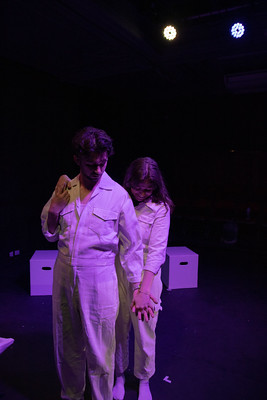Love To Love Review - Golden Goose Theatre
- London Theatre Doc
- Jun 3, 2025
- 3 min read


Love To Love, a new work written and performed by Flo Petrie, blends the synthetic sheen of reality television with the raw messiness of human emotion. Set in a near-future AI generated reality TV show where contestants are trapped in a time loop of romantic resets, the play invites us into a sterile, gamified search for intimacy. Two strangers, labelled soulmates by an algorithm, are tasked with spending 36 hours together answering 36 curated questions, an experiment designed to manufacture love. It is a premise that is at once inventive and unsettling, with flashes of sharp originality.
Petrie plays Pro, a self-aware, self-mocking embodiment of the Clapham girl archetype whose outward confidence masks deeper wounds. As the game unfolds, her emotional façade begins to fray, especially in the presence of her algorithm-assigned partner, Ant, played by Charlie Collinson. A press of a mysterious button triggers a disorienting narrative device: Pro finds herself stuck in a time loop style cycle, repeatedly re-meeting Ant with no memory of their previous encounters. Each repetition offers a slightly altered version of herself, refracted through vulnerability, bravado, and fear. The form cleverly echoes emotional self-editing in modern dating culture, where identity becomes performative and love is gamified. At times, the repetition felt hypnotic, drawing the audience into the same confused vulnerability Pro experiences herself.
This is clearly a personal and conceptually rich piece of theatre, shaped by Petrie’s distinctive voice. However, the balance between the two leads feels slightly skewed. Pro is written with nuance and complexity, but Ant remains frustratingly underexplored. His emotional arc is difficult to track, and key questions remain unanswered, most notably why his memory stays intact while hers resets and what drives his unwavering support. Without these details, the emotional stakes of their connection feel lopsided. The play might also benefit from paring back secondary ideas and focusing more directly on its core emotional journey, rather than layering in elements that are never fully explored.

The AI framework, while promising, feels more like a structural device than a narrative force that deepens the emotional and ethical questions at its core. It hints at questions around emotional authenticity, data-driven intimacy, and performative vulnerability, but these ideas are never fully developed. This leaves the audience with tantalising glimpses of a deeper narrative layer, one that, if fully explored, could offer a far more incisive reflection on how we connect in the age of algorithms.
That said, the performances are excellent. Petrie delivers a layered and compelling turn, navigating the shifts in tone and character with precision. Her performance is particularly striking in the quietest moments, where humour slips into fragility and rawness. Collinson brings warmth and calm to Ant, grounding the piece with a quiet sincerity that contrasts effectively with Petrie’s emotional volatility. While the script gives him fewer beats to play with, he shares a strong and believable connection with Petrie throughout.
Oli Bates directs with sensitivity and clarity. The staging is spare and effective, evoking the sterile artificiality of a TV experiment while allowing the actors to fill the space with emotional texture. A clean, minimal lighting design distinguishes the shifts in time and emotional tone with subtle elegance.
Love To Love is a thoughtful and promising piece that feels both perfectly at home in the experimental world of pub theatre and quietly ambitious in its reach. These are the spaces where writers test ideas, break form, and discover voice. With sharper structural clarity and deeper thematic focus, this play has the potential to grow into a compelling meditation on identity, intimacy, and the digital-age disconnects that quietly define how we love.








Comments